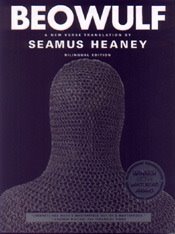 Beowulf: What Happens NEXT?
Beowulf: What Happens NEXT?
So, Beowulf killed Grendel. Ho-hum. Is that really it? That’s the end of the story? No way, dude, no way. There is, in fact, more to Beowulf’s story…but I’m not telling you what that is. Instead, it’s your job to continue this tale.
This project is due next week - October 11 (period 1) or 12 (period 2) - and you’ve got tons and tons of freedom with it. The basic idea is that you are now the storyteller and you need to tell us what comes next for Beowulf. Does he go back to Geatland? Does he decide to take over Heorot, kicking Hrothgar to the curb? Does one of his own men betray him, challenging his authority? Does Beowulf enter a time-portal and end up in the 21st Century, now visiting the mall and going grocery shopping? You can certainly take some extraordinary liberties with this project. Be creative and have fun!
What’s the format? GREAT question – that’s up to you too! Here are some ideas:
You can write it like an
epic poem. Remember the general rules – lines of similar length and using techniques like kennings and alliteration. Or, break these rules of epic poetry and write in free verse. You could write a series of poems too.
You can write a series of
ballads and play them in class. For all you guitar players out there, this might be a good option.
You could write the
story from Beowulf’s perspective, or a different character’s perspective. You can experiment with style, writing it in a modern voice, like John Gardner did with Grendel.
You could write a
graphic novel, telling your story with words and pictures. Not such a great artist? Download some pictures of Vikings from the Internet and use them in your story (just make sure to cite your source).
You could make a
movie with some friends. Or make it animated! I would expect a copy of the script too.
Write a
play – act it out in class!
Be
creative – think of another idea and run it by me!!! I would be very excited to know what other possibilities are out there.
This project is worth 100 points. That’s big. Don’t miss it, yo.
















